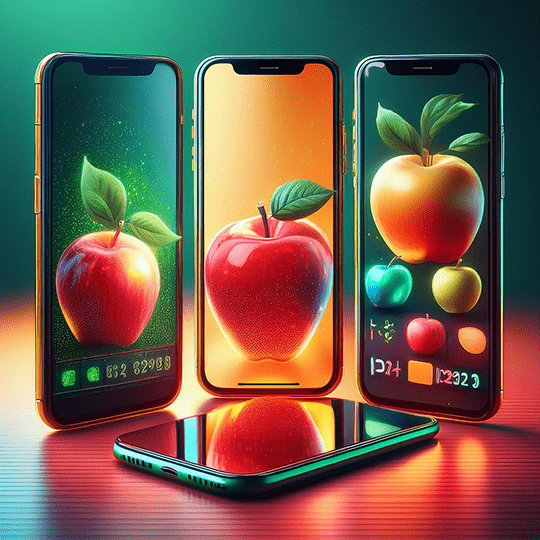Artificial intelligence (AI) is reshaping the landscape of mobile technology, changing how we engage with our devices. From boosting photo quality to refining virtual assistant interactions, AI is at the forefront of this transformation. This article delves into the evolving role of AI in mobile phones, uncovering its features, advantages, and what the future might hold.
What is AI and How Does It Work in Mobile Phones?
AI, or Artificial Intelligence, refers to systems designed to replicate human-like intelligence. In mobile devices, AI leverages machine learning and neural networks to process data, predict user behaviour, and optimize tasks seamlessly.
How AI Integrates with Mobile Devices
AI operates through an intricate mix of hardware and software. Advanced processors like Apple’s A17 Bionic and Qualcomm’s Snapdragon series, moreover, house specialized AI capabilities, enabling lightning-fast computations for tasks such as voice recognition and image enhancement.
Smarter Cameras Powered by AI
AI has revolutionized smartphone photography, turning every user into a potential photography enthusiast.

AI Scene Detection and Adjustments
Modern cameras now identify scenes—whether it’s a picturesque sunset, delectable food, or an adorable pet—and tweak settings like exposure and colour balance for optimal results.
Portrait and Bokeh Effects
AI-driven edge detection creates professional-grade bokeh effects, making portrait shots rival those taken with DSLRs.
Low-Light and Night Mode Enhancements
Through advanced algorithms, AI blends multiple frames to reduce noise and brighten images, delivering stunning detail even in dim conditions.
Real-Time Editing
From smoothing out imperfections to removing unwanted objects, AI-powered tools simplify editing in real-time, eliminating the need for extensive post-processing.
AI in Voice Assistants
Voice assistants have become indispensable for hands-free convenience in daily life.
Popular AI-Powered Voice Assistants
Siri, Google Assistant, and Alexa rely on AI to interpret and fulfil user commands, from setting reminders to cracking jokes.
Natural Language Processing (NLP)
Thanks to NLP, these assistants understand and respond to queries with greater contextual accuracy, ensuring smoother conversations.
Continuous Learning
By analyzing user interactions, voice assistants evolve over time, refining their responses and becoming more intuitive.

AI in Personalization and Recommendations
AI makes devices smarter and more tailored to individual preferences.
Adaptive App Suggestions
Smartphones can predict app usage patterns, like suggesting a fitness tracker in the morning or streaming apps at night.
Performance Management
AI optimizes system resources by monitoring app activity, enhancing performance, and preventing issues like overheating.
Content Curation
Streaming services like Spotify and YouTube harness AI to recommend playlists or videos tailored to your tastes, elevating entertainment experiences.
Enhancing Security with AI
AI has set a new standard for smartphone security.
Facial Recognition
Advanced AI algorithms power facial recognition, ensuring reliable identification even with minor changes in appearance.
Fraud Detection
Banking apps use AI to detect unusual activity, providing an extra layer of security for financial transactions.

Encryption and Threat Analysis
AI silently protects your data, using encryption and real-time threat detection to prevent breaches.
AI in Productivity and Communication
AI has streamlined productivity tools, making communication smoother and more efficient.
Predictive Text and Typing Assistance
Keyboards like Gboard offer predictive text suggestions, autocorrect, and even emoji recommendations based on context.
Real-Time Translation
Apps like Google Translate use AI for instant translations, bridging language gaps in real-time conversations.
Smart Notifications
AI filters notifications, prioritizing what’s important to keep you focused and reduce distractions.
Revolutionizing Gaming and Augmented Reality (AR)
AI has redefined mobile gaming and augmented reality experiences.
AI-Driven Gaming Experiences
Mobile games now feature AI-driven characters, lifelike graphics, and adaptable difficulty levels for a more immersive experience.
AR Integration
AI enhances AR by seamlessly blending digital objects into the real world, powering apps like Pokémon GO and interactive filters.
Accessibility Features Enhanced by AI
AI is breaking barriers with features designed for users with disabilities.
Voice-to-Text and Text-to-Speech
These tools allow users to dictate messages or have text read aloud, simplifying communication.
Visual and Hearing Assistance
Apps like Seeing AI identify objects for visually impaired users, while real-time captions help those with hearing challenges.
Challenges and Concerns of AI in Mobile Phones
Despite its numerous benefits, AI in mobile technology isn’t without challenges:
- Privacy Issues: AI needs data to function effectively, which raises concerns about its storage and usage.
- Ethical Dilemmas: Dependence on AI may diminish human autonomy.
- Cost Implications: Advanced AI features often come with a higher price tag.
Future of AI in Mobile Phones
AI’s integration into mobile devices is only the beginning.
- IoT Connectivity: Mobile phones will work seamlessly with smart home devices.
- Fully AI-Driven Devices: AI might eventually control entire user interfaces, requiring minimal manual input.
Conclusion
AI is undeniably transforming mobile phones, enhancing performance, personalization, and convenience. While its future is promising, ongoing discussions about privacy and ethics remain vital.
FAQs
- What is the most significant AI feature in mobile phones today?
Smarter cameras with scene detection are among the most impactful. - How does AI improve smartphone photography?
AI optimizes lighting, colour, and editing tools for professional-grade results. - Are AI-powered voice assistants secure?
While generally secure, data handling practices may pose risks. - Can AI in mobile phones work offline?
Basic features like photo adjustments can function offline, but complex tasks often require connectivity. - What are the limitations of AI in mobile technology?
Privacy concerns, cost, and dependence on data connectivity are significant challenges.






